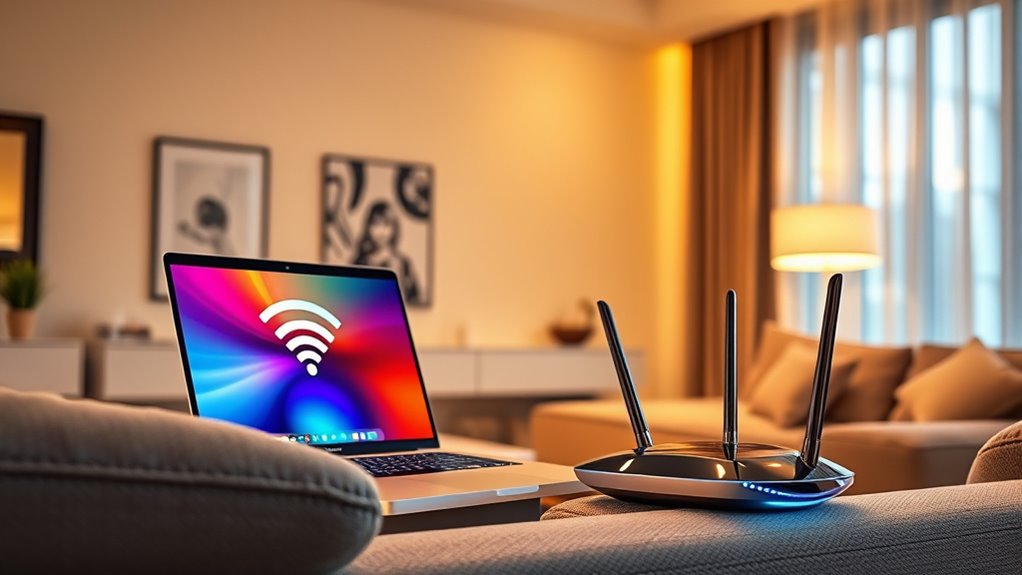Upgrading to Wi‑Fi 7 now can greatly boost your network’s speed, stability, and capacity to handle multiple devices more efficiently. You’ll experience lower latency, fewer drops, and smoother performance whether streaming, gaming, or working remotely. Plus, a Wi‑Fi 7 mesh system guarantees better coverage across larger spaces. Staying ahead with this upgrade future-proofs your setup and keeps your connection reliable as digital demands grow. If you want to learn more, keep exploring what Wi‑Fi 7 can do for you.
Key Takeaways
- Upgrading now with compatible hardware enhances your current network’s speed, reliability, and ability to handle multiple devices effectively.
- Wi‑Fi 7 offers future-proofing, ensuring your setup remains competitive as digital demands and smart devices grow.
- Existing mesh systems supporting Wi‑Fi 7 can significantly improve coverage and performance without replacing hardware entirely.
- Upgrading now reduces network congestion and interference, especially in dense environments with many Wi‑Fi networks.
- Early adoption positions you ahead, avoiding future bottlenecks and ensuring a seamless transition to the latest wireless technology.

As Wi‑Fi 7 begins to roll out, upgrading your network becomes essential to keep up with increasing data demands and device connectivity. This new standard promises faster speeds, lower latency, and more reliable connections, especially in homes and offices packed with smart devices. To fully leverage these benefits, you’ll want to consider how mesh networks can enhance your setup. Mesh systems are designed to distribute Wi‑Fi signals seamlessly across larger spaces, eliminating dead zones and maintaining consistent performance. With Wi‑Fi 7’s advanced capabilities, mesh networks will become even more effective, allowing multiple nodes to communicate more efficiently and handle higher data loads simultaneously. This means you won’t experience drops or slowdowns, even when streaming 4K videos, gaming, or working remotely with large files.
Another critical aspect of Wi‑Fi 7 is spectrum management, which helps optimize how the available radio frequencies are used. Unlike earlier Wi‑Fi standards that often struggled with congestion, Wi‑Fi 7 introduces smarter spectrum allocation techniques. These allow your router to dynamically assign channels to avoid interference, making your network more stable and faster. Spectrum management becomes especially important if you live in a densely populated area with many Wi‑Fi networks competing for space. By upgrading, you’ll gain access to these intelligent management features, ensuring your devices get the bandwidth they need without interruption or lag.
If you already have a mesh network, upgrading to Wi‑Fi 7 can be a game-changer. Modern mesh systems are designed to support the new standard, which means you can enjoy enhanced performance without replacing all your hardware at once. These systems can coordinate better, making use of Wi‑Fi 7’s spectrum management to allocate resources efficiently across devices. If you’re still relying on a single router, now might be the perfect time to switch to a mesh setup that supports Wi‑Fi 7, giving your entire home or workspace a significant boost in connectivity and speed.
In short, upgrading your network to Wi‑Fi 7 isn’t just about faster internet; it’s about smarter, more reliable connectivity that adapts to your needs. Leveraging mesh networks and spectrum management, you can create a robust, future-proof system that handles everything you throw at it — from streaming and gaming to remote work and smart home devices. As adoption grows, staying ahead with a Wi‑Fi 7 upgrade ensures you won’t fall behind in the ever-expanding digital landscape. Additionally, understanding the WWE Raw’s Financial Impact highlights how technological advancements in entertainment can influence related industries and consumer expectations.
Frequently Asked Questions
Will Wi-Fi 7 Work With Existing Routers?
Wi-Fi 7 will likely require new devices and a router upgrade, as device compatibility is essential for peak performance. Existing routers won’t support Wi-Fi 7 features, so you’ll need a compatible router upgrade to enjoy the latest speeds and efficiency. If you’re enthusiastic to benefit from Wi-Fi 7’s advancements, plan ahead for hardware updates. Until then, your current setup will continue working, but without the new Wi-Fi 7 capabilities.
What Devices Will Support Wi-Fi 7 First?
You’ll find that early adoption of Wi-Fi 7 primarily supports high-end devices like gaming laptops, smartphones, and routers designed for advanced device compatibility. These gadgets are the first to support Wi-Fi 7’s faster speeds and lower latency. Keep in mind, not all devices will support Wi-Fi 7 initially, so if you’re enthusiastic to upgrade, focus on those marked for early adoption to maximize benefits while waiting for wider compatibility.
How Much Faster Is Wi-Fi 7 Compared to Wi-Fi 6?
Imagine the thrill of blazing speeds—Wi-Fi 7 promises a significant leap over Wi-Fi 6. You’ll see a speed comparison that can be up to 2-4 times faster, thanks to latest technology advancements. This means smoother streaming, faster downloads, and seamless gaming. If you crave cutting-edge connectivity, upgrading now could release these benefits sooner, ensuring you’re ahead of the curve and ready for the future of wireless tech.
Is Wi-Fi 7 More Secure Than Previous Versions?
You might wonder if Wi-Fi 7 is more secure than previous versions. It offers improved network encryption, making your data safer from cyber threats. However, device compatibility is vital—older devices may not support these new security features, leaving gaps. Upgrading ensures you benefit from the latest security protocols, but you’ll need compatible hardware to fully take advantage of Wi-Fi 7’s enhanced security.
Will Upgrading to Wi-Fi 7 Improve Gaming Performance?
Upgrading to Wi-Fi 7 can substantially improve your gaming performance by reducing gaming latency and enhancing bandwidth optimization. You’ll notice smoother gameplay and less lag, especially if your current network struggles with multiple devices or high data demands. Wi-Fi 7’s faster speeds and better connection stability give you a competitive edge, making it worth considering now if you want a more seamless gaming experience.
Conclusion
With over 80% of households expected to adopt Wi-Fi 7 within the next two years, upgrading now means you’ll enjoy faster speeds and better connectivity before everyone else. If you rely on streaming, gaming, or smart devices, this new standard could be a game-changer. Don’t miss out on the future of wireless tech—upgrading now guarantees you’re ahead of the curve and prepared for the increased demands of modern digital life.









